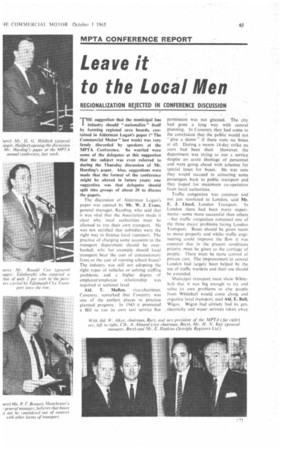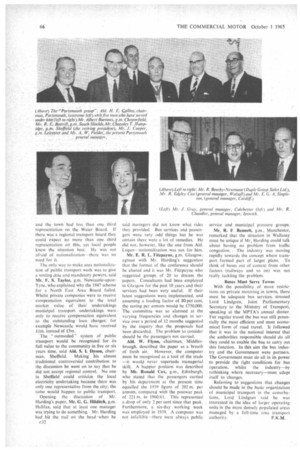Leave it to the Local Men
Page 67

Page 68

If you've noticed an error in this article please click here to report it so we can fix it.
REGIONALIZATION REJECTED IN CONFERENCE DISCUSSION
THE suggestion that the municipal bus I industry should " nationalize " itself by forming regional area boards, con. tained in Alderman Logan's paper ("The Commercial Motor" last week) was very firmly discarded by speakers at the MPTA Conference. So worried were some of the delegates at this suggestion that the subject was even referred to during the Thursday discussion of Mr. Harding's paper. Also, suggestions were made that the format of the conference might he altered in future years: one suggestion was that delegates should split into groups of about 20 to discuss the papers.
The discussion of Alderman Logan's paper was opened by Mr. W. J. Evans, general manager. Reading, who said that it was vital that the Association made it clear why local authorities must be allowed to run their own transport. He was not satisfied that subsidies were the right way to finance local transport. The practice of charging some accounts to the transport department should be overhauled; why for example should local transport bear the cost of concessionary fares or the cost of running school buses? The industry was still not adopting the right types of vehicles or solving staffing problems. and a higher degree of employer/employee relationship was required at national level.
Aid. T. Meffen, vice-chairman. Coventry. remarked that Coventry was one of the earliest places to practice planned progress., In 1943 it promoted a Bill to run its own taxi service but permission was not granted. The city had gone a long way with central planning. In Coventry they had come to the conclusion that the public would not " give a damn" if there were no buses at all. During a recent 14-day strike no tears had been shed. However, the department was trying to run a service despite an acute shortage of personnel and were going ahead with schemes for special lanes for buses. He was sure they would succeed in attracting some passengers back to public transport and they hoped for maximum co-operation from local authorities.
Traffic congestion was common and not just restricted to London. said Mr. F. J. Lloyd, London Transport. In London there had been many experiments—some more successful than others --but traffic congestion remained one of the three major problems facing London Transport. Buses should be given room to moveproperly and whilst traffic engineering could improve the flow it was essential that in the present conditions priority must be given to the carriage of people. There must be more control of private cars. The improvement in central London had largely been helped by the use of traffic wardens and their use should he extended.
Municipal transport must show Whitehall that it was big enough to try and solve its own problems or else people from Whitehall would come along and organize local transport. said Aid. E. Ball, Wigan. Wigan had already had its gas, electricity and water services taken away
and the town had less than one third representation on the Water Board. If there was a regional transport board they could. expect no more than one third representation on this, yet local people knew the situation hest. He was not afraid of nationalization—there was no need for it_ The only way to make area nationalization of public transport work was to give a vesting date and mandatory powers, said Mr. F. S. Taylor, g.m. Newcastle-uponTyne, who explained why the 1947 scheme for a North East Area Board failed. Whilst private companies were to receive compensation equivalent to the total market value of their. undertakings municipal transport undertakings were .r only to receive compensation equivalent to the outstanding loan charges: for example Newcastle would have received ft m. instead of £5m.
The "outmoded system of public transport would be recognized for its full value to the community in five or six years time, said Aid. S. L Dyson, chairman, Sheffield. Making his almost traditional controversial contribution to the discussion he went on to say that he did not accept regional control. No one in Sheffield could criticize the local electricity undertaking because there was only one representative from the city; the same would happen to public transport.
Opening the discussion of Mr. Harding's paper, Mr. G. G. Hilditelt, gin. Halifax, said that at least one manager was trying to do something. Mr. Harding had hit the nail on the head 'when he c32 said managers did not know what rides they provided. Bus services and passengers were very odd things but he was certain there were a lot of remedies: He did not, however, like the one from Aid. Logan—nationalization was not for him.
Mr. E. R. L. Fitzpayne, g.m. Glasgow, agreed with Mr. Harding's suggestion that the format of the conference should be altered and it was Mr. Fitzpayne who suggested groups_ of -20 to discuss the papers. Consultants had been employed in Glasgow for the past 10 years and their services had been very useful. If their latest suggestions were implemented, and assuming a loading factor of 80,per cent, the saving per annum would be £750,000. The committee was so alarmed at the varying frequencies and changes in service over a period of 12 months suggested by the inquiry that the proposals had been discarded. The problem to consider should be the passengers not carried.
AM. W. Flynn, chairman, Middlesbrough. described the paper as a breath of fresh air. However, the computer must be recognized as a tool of the trade —it would never supersede managerial skill. A happier position was described by Mr. Ronald Cox, g.m., Edinburgh, who stated that the passengers carried by his department at the present time equalled the 1939 figure of 202 in. per annum, compared with the postwar peak of 221 m. in 196061. This represented a drop of only 2 per cent since that peak. Furthermore, a six-day working week was employed in 1939. A computer was not infallible--there were always public service and municipal pressure groups.
Mr. R. F. Bennett, g.m., Manchester, remarked that the situation in Wallasey must be unique if Mr, Harding could talk about having no problem from traffic congestion.. The industry was moving rapidly towards the concept where transport formed part of larger plans. To think of buses out of context from other factors (railways and so on) was not really tackling the problem.
Buses Must Serve Towns With the possibility of more restrictions on private motoring in towns, there must be adequate bus services, stressed Lord Lindgren, Joint Parliamentary Secretary to the Ministry of Transport, speaking at the MPTA's annual dinner. Forregular travel the bus was still potentially the most efficient and most economical form of road travel. It followed that it was in the national interest that the authorities responsible should do all they could to enable the bus to carry out this function. In this aim the bus industry and the Government were partners. The Government must do all in its power to provide the right conditions for bus operation, whilst the industry—by rethinking where necessary—must adapt itself to changes.
Referring to suggestions that changes should be made in the basic organization of municipal transport in the conurbations, Lord Lindgren said he was interested in the idea of larger operating units in the more densely populated areas managed by a full-time area transport authority. F.K.M.












































































































































































